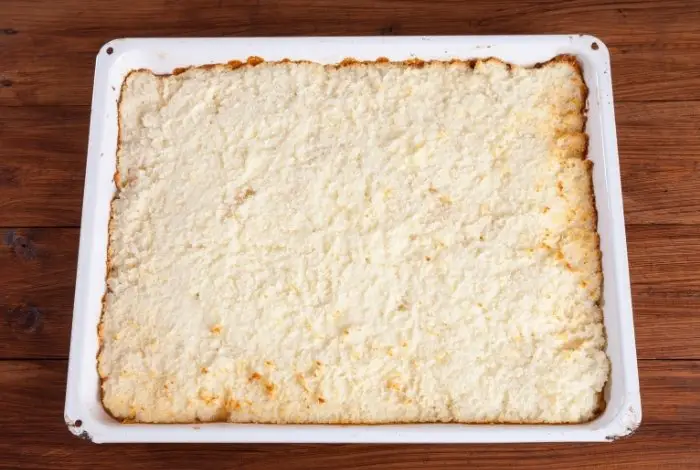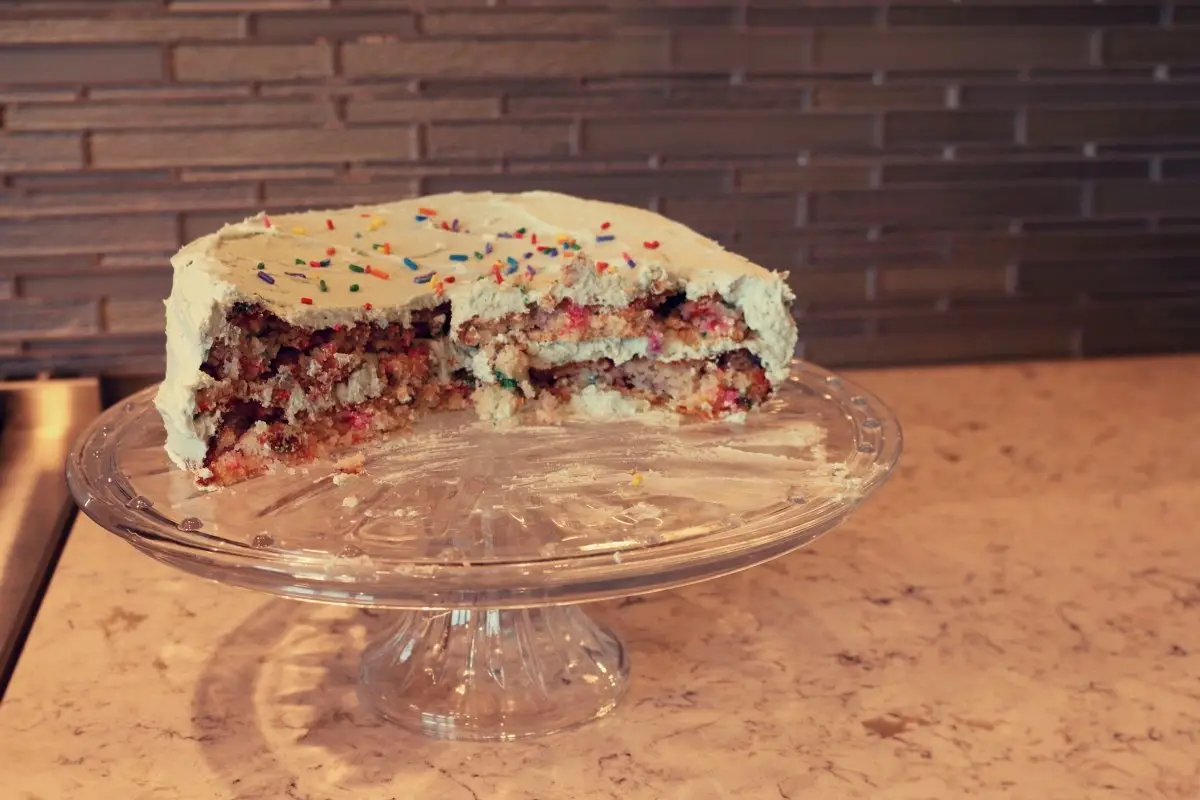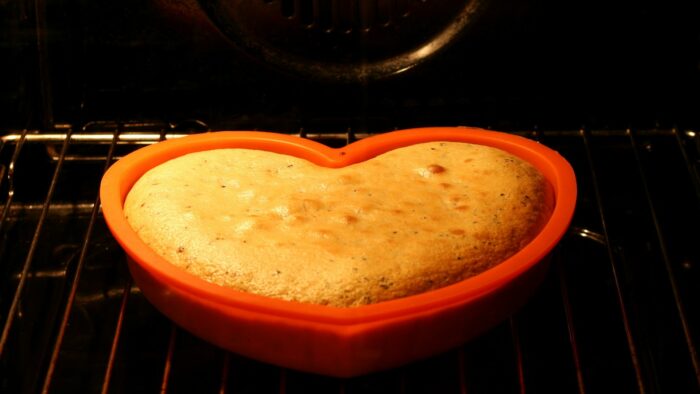Last Updated on February 12, 2023
Nothing is worse when you are baking than pulling your cake out of the oven only to find out it’s flat. This will lead you to wonder, why didn’t my cake rise?
Having a cake that didn’t rise is very frustrating. You put all that hard work into making a cake only for it to fall flat. There can be several reasons why your cake didn’t rise, but fortunately, most of them are easy fixes.
Having a cake not rise can happen to anyone. However, when it happens, most of the time the cake can not be saved, as the middle will have collapsed.
Why Didn’t My Cake Rise – Reasons
To help prevent your cake from collapsing in the future, you will want to try to figure out where you went wrong. Once you find the source of your problem, you will know what not to do next time.
There are a few common reasons why your cake didn’t rise. It likely will either be an issue with your ingredients or equipment.

#1 You Measured Your Ingredients Wrong
A common mistake people make is not properly measuring their ingredients. People often use measuring cups when baking, but this is not always accurate. When using measuring cups, spoon your ingredients into them and then level them off to ensure you are not adding too much.
The most accurate way to measure your ingredients is by using a scale. Digital kitchen scales allow you to measure the exact amount of your ingredients. This is an easy yet effective way to help ensure your cake will rise.
#2 Your Baking Powder Has Expired
One of the most common reasons why a cake didn’t rise is that the baking powder was expired. Baking powder is a key ingredient in cakes as it works as a leaving agent.
When mixed with water, baking powder will produce air bubbles. As cakes bake in the oven, the air bubbles expand which leads to the cake rising.
Make sure the baking powder you are using is not expired. If you are unsure if it is still good, put a 1/2 teaspoon of baking powder into a cup of hot water. If the baking powder fizzes, it is still good, if nothing happens then it is no longer good.
Make sure you store your baking powder in an airtight container in a cool, dry place. Baking powder that is not properly stored will lose its freshness quicker than when it is properly stored.
The same thing goes for baking soda if your recipe calls for it. Make sure it has not expired by adding a 1/2 teaspoon of baking soda to one cup of vinegar. If it fizzes it is still good, if not you need to throw it out.
#3 Your Oven Is The Wrong Temperature
Oven temperature is very important when it comes to baking a perfect cake. An oven at the wrong temperature can lead to your cake not baking properly. If the temperature is too low, your cake won’t cook all the way through. The cake will rise too much, then fall in the center before it can set. On the other hand, if it is too hot it will overcook and become hard.
Make sure to check that your oven is calibrated to the right temperature. Some older ovens may not be set to the right temperature, so be sure to make any adjustments as needed. It is key that your cake bakes at the temperature the recipe calls for.
#4 You Used the Wrong Type of Pan
Be sure to use the right pan for the cake you are making. Using a different shape pan than what the recipe says can mess up the cake. If you decide to use a different pan, be sure to adjust the time accordingly.
Amazon Basics 6-Piece Nonstick Oven Bakeware Baking Set
#5 You Didn’t Cream the Butter Mixture Long Enough
Creaming butter and sugar together is key to giving your cake a good texture. If you did not cream the butter and sugar long enough, your cake may not rise. Creaming incorporates air into the mixture, so be sure to beat the butter and sugar long enough that it is smooth and creamy.
How to Fix Dense Cake
There are many easy fixes to ensure you don’t have a dense cake. Let’s take a closer look.
- stick to the recipe. I know it’s tempting to double the recipe, half the recipe, or even triple the recipe – but if you’re new to baking, you should stick to the recipe you’re following. You’re more likely to make mistakes when veering away from the steps of your recipe, and it can become confusing.
- add baking powder or baking soda. If you’re looking for a way to make your cakes rise effectively, using a leavening agent is the easiest way to do this. Most recipes call for 1-2 tablespoons. If you’re unsure how much to use, you should add around 1/4 teaspoon of baking soda, for every 1 cup of flour.
- use room temperature ingredients. Using cold ingredients such as milk, eggs, cream, butter, etc., can all contribute to a dense cake. Ensure all your ingredients are at room temperature before adding them to your cake batter.
- sour cream. Adding around 1/2 cup of sour cream to your cake batter can ensure your cake is light and creamy. The same can be said for cream cheese too. However, both of these have a distinct tastes, and they’re likely to change the flavor of your cake slightly.
- use cake flour. Cake flour is much finer than regular flour and makes for a light and tender cake. Most bakers tend to use this flour to ensure they have fluffy cakes, that are hard to resist.
- vegetable oil. Add a few tablespoons of oil to your cake batter to ensure it doesn’t come out dry and dense.
Why My Cake Didn’t Rise in the Middle?
The most common reason why cakes don’t rise in the middle is that they simply weren’t baked for long enough. To check whether your cake is ready in the center, just stick in a toothpick; if it comes out clean, or with very few crumbs, then your cake is fully baked and unlikely to sink in the middle.
You should also ensure you’re using the correct amount of leavening agent, that you’re following the correct temperature for your cake, and that you don’t open the oven door often throughout baking. All of these can contribute to your cake not rising in the middle.
Does Cake Have Yeast?
No. Cake and cake products do not typically contain yeast. When a baked good contains yeast, it comes under the category of bread. Yeast is a type of leavening agent, and the leavening agents used in cake are either baking powder or baking soda.
Do You Need Baking Powder for Cake?
Baking powder (or baking soda) is often necessary to make light and fluffy baked goods, especially cakes. However, there are a few substitutes you can try if you’re looking for other options. Some other options include yogurt, buttermilk, cream of tartar, molasses, lemon juice, or vinegar. You should research how much to add to your batter before directly switching them out of your recipe.
Another option is to use self-rising flour. This type of flour already contains baking powder (and salt), so you wouldn’t need to add any additional leavening agent.
What Makes Cakes Rise?
The main ingredient that makes cakes rise is leavening agents. When it comes to cakes, this is usually either baking powder or baking soda. When it comes to other baked goods, such as bread, you’ll use a leavening agent called yeast to help it rise.
Why Didn’t My Cake Rise: Key Steps and Conclusion
I hope this post has helped to answer the question of why didn’t my cake rise. Many reasons can lead to your cake not rising. To help prevent it from happening be sure your baking powder and baking sugar are still good, you measured your ingredients correctly and you properly creamed your butter and sugar. In addition, make sure your oven is at the right temperature and you used the correct pan.
Do you have any questions about why your cake didn’t rise? If so, please ask them in the comments down below.
Read more about What Ingredient Makes A Cake Rise?

Ever since she was a young girl, Anna has been a lover of desserts. As an adult, she enjoys
baking a variety of desserts from cakes, cookies, brownies, bread, and more from scratch. She
enjoys sharing her passion for baking with others who also have a sweet tooth. From properly
measuring ingredients to making sure they are the correct temperature, Anna knows the
importance small details can make in baking. She wants to share her experience with others in
hopes they can make the most delicious baked goods. When she’s not busy blogging, Anna
enjoys trying new recipes in the kitchen.



